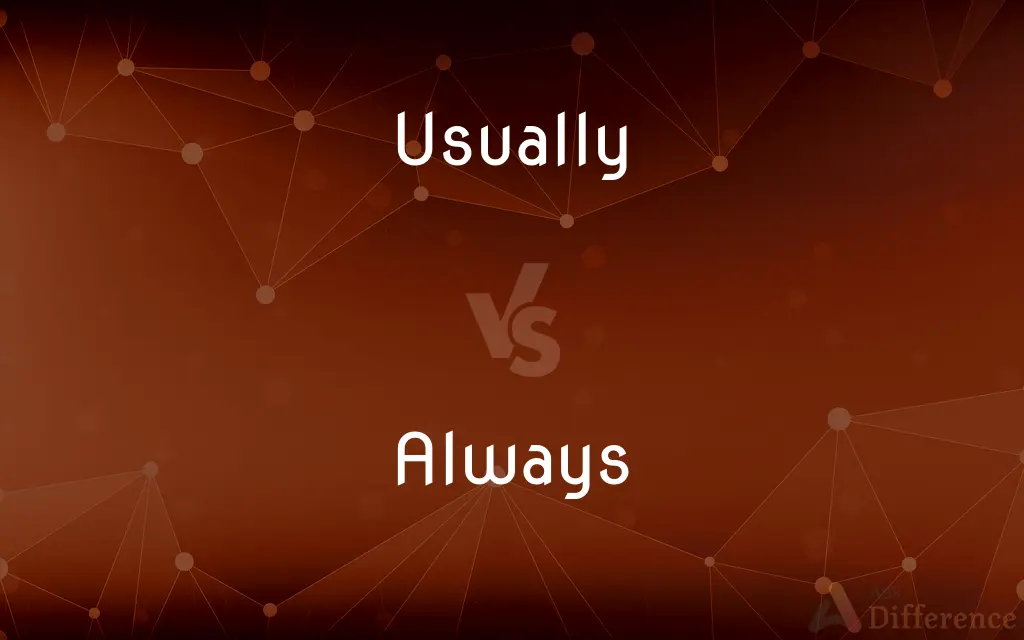Usually vs. Always — What's the Difference?
Edited by Tayyaba Rehman — By Maham Liaqat — Updated on April 15, 2024
"Usually" implies a frequent occurrence but allows for exceptions, while "always" indicates a constant or invariable situation without exceptions.

Difference Between Usually and Always
Table of Contents
ADVERTISEMENT
Key Differences
"Usually" suggests that something happens most of the time but not in every case, acknowledging the possibility of variation. On the other hand, "always" means it occurs every single time, emphasizing consistency and absence of deviation.
When using "usually," one indicates a common pattern or general trend, such as in habitual behaviors or regular occurrences. Whereas "always" conveys a sense of certainty and perpetuity, often used to describe unchanging truths or rules.
In terms of reliability, "usually" provides a less definitive statement, allowing for flexibility and unpredictability in outcomes. Conversely, "always" offers a guarantee of recurrence, providing a stronger level of assurance.
In language, "usually" is often used to describe statistical majorities or probabilities, which are not absolute. In contrast, "always" is used to state absolutes, useful in laws, formulas, and fixed principles.
The choice between "usually" and "always" can significantly affect the tone of a statement; "usually" softens assertions, making them more accessible, while "always" strengthens them, potentially making them more rigid.
ADVERTISEMENT
Comparison Chart
Frequency
Most of the time, but not always
At all times, without exception
Implication
Suggests a trend or common occurrence
Indicates certainty and continuity
Flexibility
Allows for exceptions
No exceptions allowed
Usage
Describes habits or general truths
Used for unchangeable truths or rules
Tone
Softer, implies probability
Stronger, implies inevitability
Compare with Definitions
Usually
Under normal conditions or in most cases.
She usually takes the bus to work.
Always
Every time, without fail.
She always checks her email first thing in the morning.
Usually
More often than not; commonly.
The meetings are usually held in the main conference room.
Always
At all times; invariably.
The sun always rises in the east.
Usually
Customarily, as a habit or general practice.
He usually orders coffee after his meal.
Always
Forever, throughout all time.
She promised to always love him.
Usually
In the usual manner.
The teacher usually starts the class with a brief overview.
Always
As a last resort.
When in doubt, he always asks for help.
Usually
Typically, as is most often the case.
The park is usually crowded on weekends.
Always
In any event or circumstance.
He always forgets his keys.
Usually
Commonly encountered, experienced, or observed
The usual summer heat.
Always
At all times; on all occasions
The sun always rises in the east
Usually
Regularly or customarily used
Ended the speech with the usual expressions of thanks.
Always
As a last resort; failing all else
If the marriage doesn't work out, we can always get divorced
Usually
In conformity with regular practice or procedure
Come at the usual time.
Always
At all times; invariably
Always late.
Usually
Most of the time; less than always, but more than occasionally.
Except for one or two days a year, he usually walks to work.
Always
For all time; forever
They will always be friends.
Usually
Under normal conditions.
Always
At any time; in any event
You can always resign if you're unhappy.
Usually
Under normal conditions;
Usually she was late
Always
At all times; throughout all time; since the beginning.
God is always the same.
Green has always been my favorite color. I’ve loved it for as long as I can remember.
Airplanes did not always exist as a form of transportation.
Always
Constantly during a certain period, or regularly at stated intervals (opposed to sometimes or occasionally).
In this street, the shops always close during lunchtime.
Always
(informal) In any event.
I thought I could always go back to work.
Always
At all times; ever; perpetually; throughout all time; continually; as, God is always the same.
Even in Heaven his [Mammon's] looks and thoughts.
Always
Constancy during a certain period, or regularly at stated intervals; invariably; uniformly; - opposed to sometimes or occasionally.
He always rides a black galloway.
Always
At all times; all the time and on every occasion;
I will always be there to help you
Always arrives on time
There is always some pollution in the air
Ever hoping to strike it rich
Ever busy
Always
Seemingly without interruption; often and repeatedly;
Always looking for faults
It is always raining
He is forever cracking jokes
They are forever arguing
Always
At any time or in any event;
You can always resign if you don't like it
You could always take a day off
Always
Forever; throughout all time;
We will always be friends
I shall treasure it always
I will always love you
Common Curiosities
How can replacing "usually" with "always" change a sentence's meaning?
It changes from implying a frequent occurrence to stating an absolute fact.
Is "usually" a definitive statement?
No, it allows for variations and exceptions.
Why might someone use "usually" instead of "always"?
To express a general trend without committing to an absolute.
Is "always" appropriate for describing habits?
Yes, if the habit occurs without fail.
What is the impact of "always" in legal terms?
It creates a binding or absolute condition in legal documents.
What does "usually" imply in daily conversation?
It implies something happens often but not every time.
In what contexts is "usually" most appropriately used?
"Usually" is most appropriately used in contexts where there is a need to describe typical or common occurrences without asserting that they happen every single time.
Can "always" ever include exceptions?
No, "always" means something happens every single time without exceptions.
How does the usage of "usually" affect the perception of reliability?
The usage of "usually" can make statements seem less reliable or certain because it implies that there are occasional deviations from the norm.
Can "usually" describe regular events?
Yes, it is often used to describe events that occur regularly but not exclusively.
What are the implications of using "always" in promises or commitments?
Using "always" in promises or commitments implies a perpetual obligation, suggesting an enduring, unchangeable commitment.
Does the choice between "usually" and "always" affect the formality of language?
Yes, the choice can affect formality. "Always" might be seen as more definitive and formal, while "usually" is less assertive and can be perceived as more casual or colloquial.
Can "always" be used hyperbolically?
Yes, "always" is sometimes used hyperbolically in everyday speech to emphasize a strong or frequent habit, even though it may not be literally true at all times.
Share Your Discovery

Previous Comparison
Suit vs. Tuxedo
Next Comparison
Inhomogeneous vs. HeterogeneousAuthor Spotlight
Written by
Maham LiaqatEdited by
Tayyaba RehmanTayyaba Rehman is a distinguished writer, currently serving as a primary contributor to askdifference.com. As a researcher in semantics and etymology, Tayyaba's passion for the complexity of languages and their distinctions has found a perfect home on the platform. Tayyaba delves into the intricacies of language, distinguishing between commonly confused words and phrases, thereby providing clarity for readers worldwide.
















































